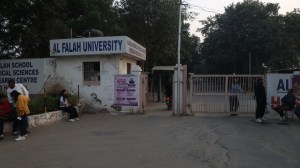Right to Information
The Freedom of Information Act has not yet been enacted. Our Supreme Court, in its celebrated judgement delivered in 1980, spelled out this ...

The Freedom of Information Act has not yet been enacted. Our Supreme Court, in its celebrated judgement delivered in 1980, spelled out this right from the fundamental right of speech and expression guaranteed by Article 191a of the Constitution. Thus right of information by judicial interpretation acquired constitutional status. This right is not absolute. It can, as in the case of freedom of expression, be reasonably restricted inter alia in the interest of the security of the State.
A writ petition was filed in the Bombay High Court seeking disclosure of a report prepared by the Atomic Energy Regulatory Board in November 1995 documenting therein alleged safety violations and defects in various nuclear installations and power plants across the country. The Government contended that the said report was classified as 8216;8216;Secret8217;8217; and its disclosure would be injurious as it would enable 8216;8216;unfriendly persons8217;8217; to estimate and monitor the strategic activities of the plants. The Board8217;s report was available in Court for its perusal if it so desired. The High Court dismissed the writ petition.
The Supreme Court affirmed the High Court judgement. It recognised the importance of freedom of information for effective enforcement of accountability in a democracy and in matters pertaining to the health and safety of citizens. The Court, however, held that a matter which is sensitive by its very character cannot be subject matter of a right to information. It noted that the Atomic Energy Board monitors and reviews the working of all nuclear installations in India, makes periodic assessment of their safety status and its suggestions for modifications and improvements to upgrade their safety status are implemented to the maximum extent. The Court ruled that any information relating to the training features, processes or technology in nuclear plants cannot be disclosed as that may render them vulnerable to sabotage. The Court thus performed a delicate balancing act in the context of the factual scenario and its legitimate concern for national security.
Conventional Lies
8216;8216;Don8217;t tell lies8217;8217; was a constant lesson to us at home and in school. There are different categories of lies. There are malicious lies to cover up one8217;s wrongdoing and falsely implicate others. A person telling such lies in a court of law could be prosecuted for perjury. Unfortunately courts are overburdened and perjury is not taken seriously.
Then there are harmless lies like instructing your staff to tell the caller you are not at home because you do not wish to be disturbed. Theologians would describe them as venial lies.
Another form of lying is undeserved glowing references made in a recommendation about an applicant seeking a job or a position. That is serious because it is tantamount to deceiving the organisation to whom the recommendation is addressed.
Obituary references to the departed soul are the most common form of lying in public. It is unkind to speak ill of a person who is dead and gone. But is it necessary to discover hidden talents and imaginary virtues in the deceased? A familiar instance is the lavish praise poured on a mediocre lawyer or a pedestrian judge. It is nauseating when a deceased politician or a public figure with a solid reputation for lack of integrity is lauded for his or her contribution to the nation. But we are generous-hearted people and these conventional lies are expected and accepted, perhaps with a pinch of salt. In any case truth is not a prized commodity in our society.
Religious Freedom
Our Constitution guarantees to every person, citizen and non-citizen alike, the fundamental right to profess, practice and propagate religion. This right is not absolute but is subject to public order, morality and health. No one can deny any religious denomination the right to recite prayers, perform its rituals and ceremonies. But surely this does not comprise the right to encroach on public roads, obstruct traffic and disturb peace and quiet by reciting payers or engaging in religious discourses at maximum volume deep into the night.
A blatant example of this phenomenon was the recent function at Marine Lines in Bombay in the vicinity of the Bombay Hospital. Doctors rushing to the hospital to attend to emergency cases were held up for considerable time. The organisers were obviously unmindful of the distress caused to the patients in the hospital. Such lack of considerateness is not the monopoly of any particular religious denomination but is a common failing. The regrettable part is that the police remain mute spectators to this brazen breach of the applicable rules and regulations.
Religious freedom is expressly made subject to 8216;8216;morality8217;8217;. And is it not a negation of elementary morality to cause avoidable pain and suffering to one8217;s fellow citizens? Religious leaders and organisers of religious functions may well ponder on that.
- 01
- 02
- 03
- 04
- 05






























